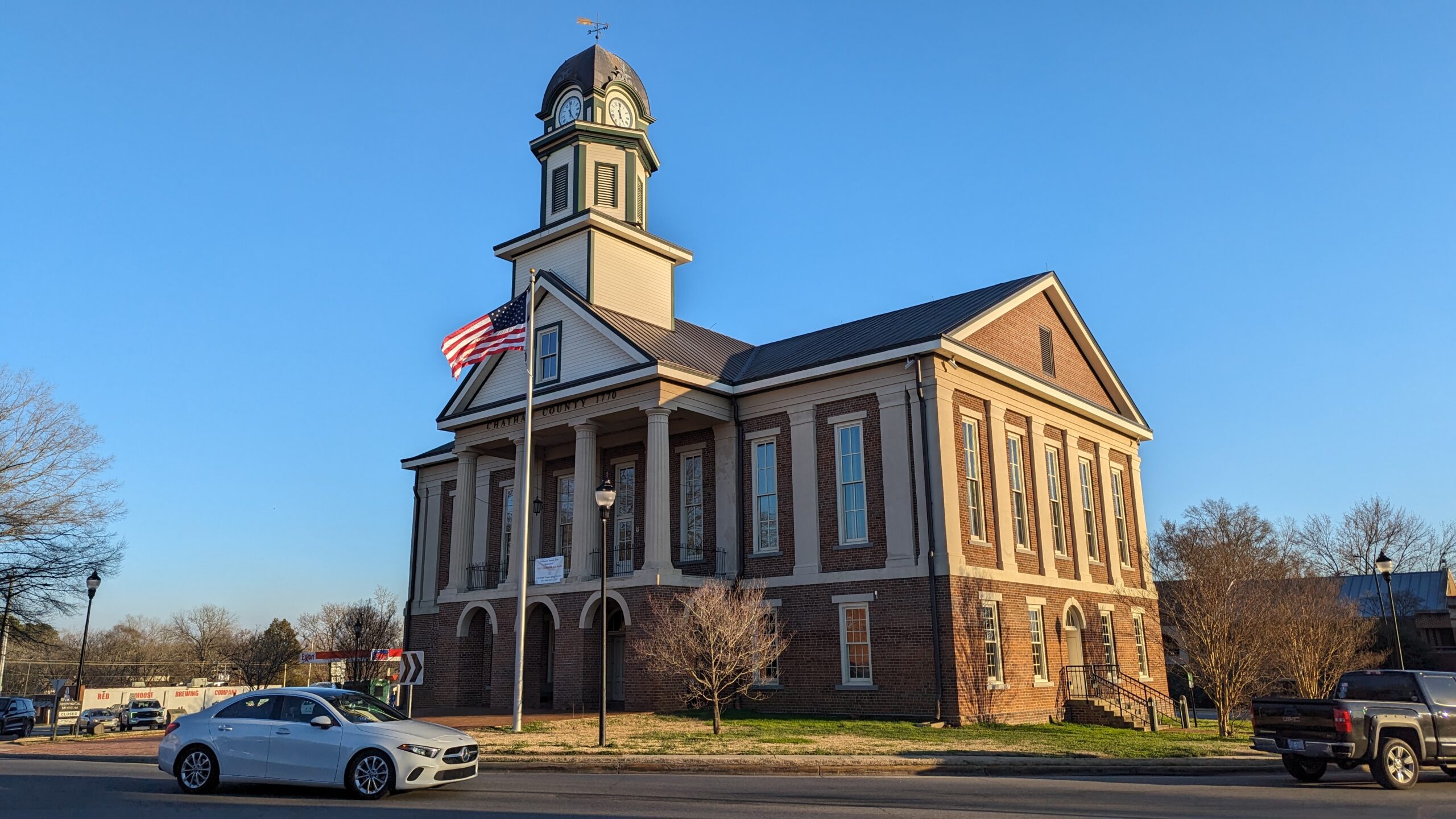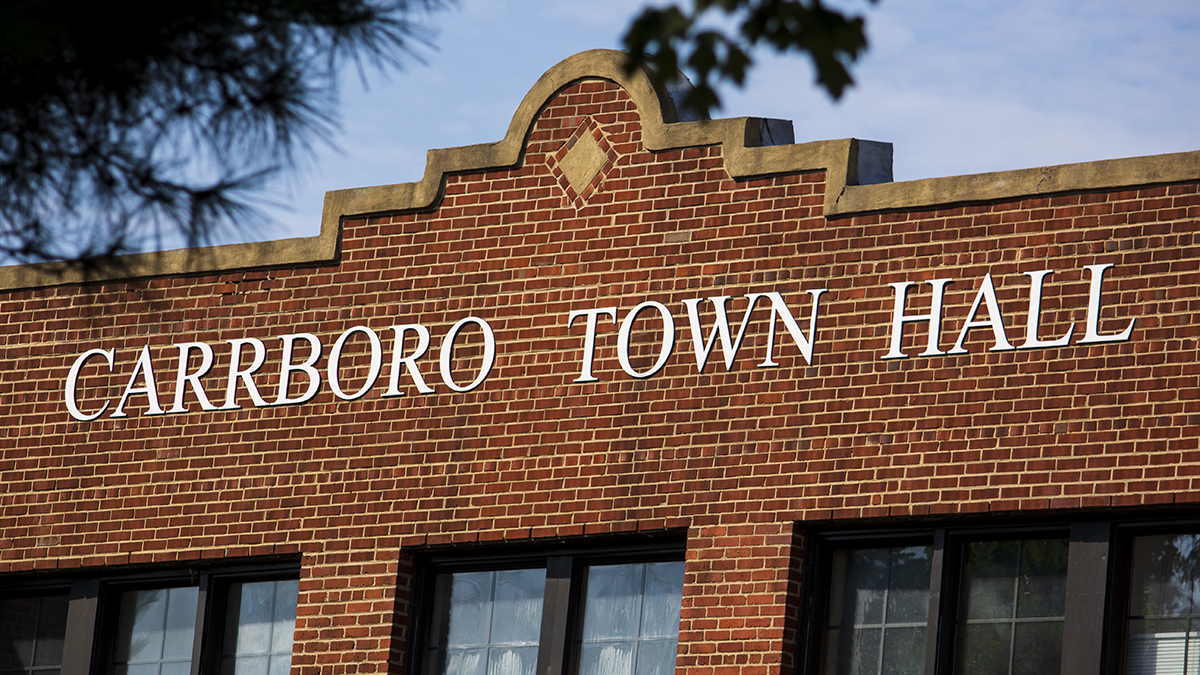A new plaque coming to the entrance of Carrboro Town Hall will memorialize the town’s roots, including its founder Julian Carr and civil rights efforts in the town.
Language for the plague was approved unanimously by the Board of Aldermen this week, after months of work from a task force of residents.
The plaque’s language begins where Carrboro first began, at the end of the Carolina Railroad that extended south to the edge of Chapel Hill and the first textile mill that opened nearby. Originally known as West End and Lloydville, and then Venable in 1911, Carrboro received its current name soon after. Task force member Rani Dasi read from the plaque’s language at the Tuesday evening board meeting.
The plaque’s final paragraph notes efforts in the 1970s by residents to, “change the town’s power structure and advocate for a community that fully included all residents.”
Aldermen Damon Seils noted after the presentation that the plaque falls in line with a resolution the board passed following the Charlottesville white supremacist rally in 2017. A board resolution passed in the days after the events in Charlottesville included a commitment to take steps “identifying and acknowledging Carrboro’s own racist history.”
“The work that we charged ourselves with doing was not just about telling history but also about working on the present,” he said. “This helps us get there, but we have other work to do as well. And I just want to raise that as a challenge to all of us on the board as well as the people in the room.”
Along with this plaque’s language, the aldermen approved the task force’s request for further exploration of additional historical plaques on local history.
The complete approved language of the plaque can be found below:
Carrboro’s roots began in the late 19th century when a branch of the North Carolina Railroad extended south to the edge of Chapel Hill, and the first local textile mill opened nearby. Informally known as West End and Lloydville, the community incorporated as a town named Venable in 1911.
Two years later, the state legislature renamed the town Carrboro at the request of Julian S. Carr, a post-Civil War business leader. He was also an active and influential participant in Jim Crow era efforts to create a system of racial segregation. Although the town continues to bear his name, the values and actions of Carr do not represent Carrboro today.
In the 1970s a group of Carrboro residents joined together to change the town’s power structure and advocate for a community that fully included all residents. Thanks to their commitment, today Carrboro honors its working-class roots while reaching toward the goals of social equity, environmental harmony, and fiscal responsibility.
Related Stories
‹

Extraordinary Thrift Store In Carrboro Sets February Opening DateExtraordinary Thrift Store in Carrboro, formerly CommunityWorx Thrift Store, announced it will open to the public on Friday, Feb. 27.

Carrboro's E. Weaver Street to Close to Vehicles Every Weekend in April, Temporary Bike-Ped PlazaStarting in April, Carrboro’s East Weaver Street will be closed to vehicles every weekend — the town's next step in reimagining East Weaver.

Local Government Meetings: February 9-13, 2025This week in local government: residents in Chatham County push back against Flock license-plate cameras and AI data centers.
![]()
Carrboro: Comprehensive Plan, Black History, Refreshed WebsiteCarrboro Mayor Barbara Foushee spoke with 97.9 The Hill's Andrew Stuckey on Friday, February 6, discussing town news and events. She talked about the recent meeting of the town council, which saw an update on the town's comprehensive plan. She also talked about the council directing town staff to see if there are more support options for unhoused residents. She discussed some of the town's numerous Black History Month events, talked about the recently refreshed town website, and more.

Local Government Meetings: February 2-6, 2026This week in local government: Durham considers the RTP's long-term development plans, and Carrboro gets an update on its comprehensive plan.
![]()
Carrboro: Storm Response, Carrboro Works, Weaver Street ReimaginedCarrboro Mayor Barbara Foushee spoke with 97.9 The Hill's Andrew Stuckey on Friday, January 30, discussing town news and events. She talked about the previous weekend's winter storm, the upcoming weekend's winter storm, and Carrboro Works superior performance through the storm in spite of still not having a home after this summer's flooding. She also discussed a proposed upcoming pilot to "Reimagining East Weaver Street," which would see the block closed to vehicle traffic on weekends for a six month period, and more.

Carrboro Man Arrested For String of Briar Chapel Vehicle Thefts, Break-InsThe Chatham County Sheriff’s Office announced the arrest of a Carrboro man believed to be responsible for a string of vehicle break-ins and thefts in the Briar Chapel neighborhood. Kevin Hernandez Sierra, an 18-year-old Carrboro resident, has been charged with 11 felonies and three misdemeanors, ranging from felony breaking and entering to a motor vehicle […]
![]()
Carrboro Film Fest Rescheduled for February 27 — March 1, 2026 Due to Winter StormCarrboro Film Fest has rescheduled their 20th festival to take place a month later than normally scheduled, due to hazardous weather conditions.

Orange County Communities to Observe Martin Luther King Day Jan. 19. Here's How it Affects Services.The observation of Martin Luther King, Jr. Day on Monday, Jan. 19 will affect local government services around the Orange County community. Here’s what residents can expect this year: Town of Chapel Hill Most town offices will be closed Monday. Residential trash normally collected Monday will be collected Wednesday, Jan. 21. Curbside recycling collection will […]
![]()
Carrboro: Protests, Poet's Party, MLK PreviewCarrboro Mayor Barbara Foushee spoke with 97.9 The Hill's Andrew Stuckey on Friday, January 16, discussing town news and events. She discussed participation in a protest march in Carrboro last weekend. She also outlined the Poet's Party at the Drakeford Library Complex, as well as previewing next weekend's Carrboro Film Fest at the same location. She also previewed several Martin Luther King, Jr. Day activities in our community, and more.
›








